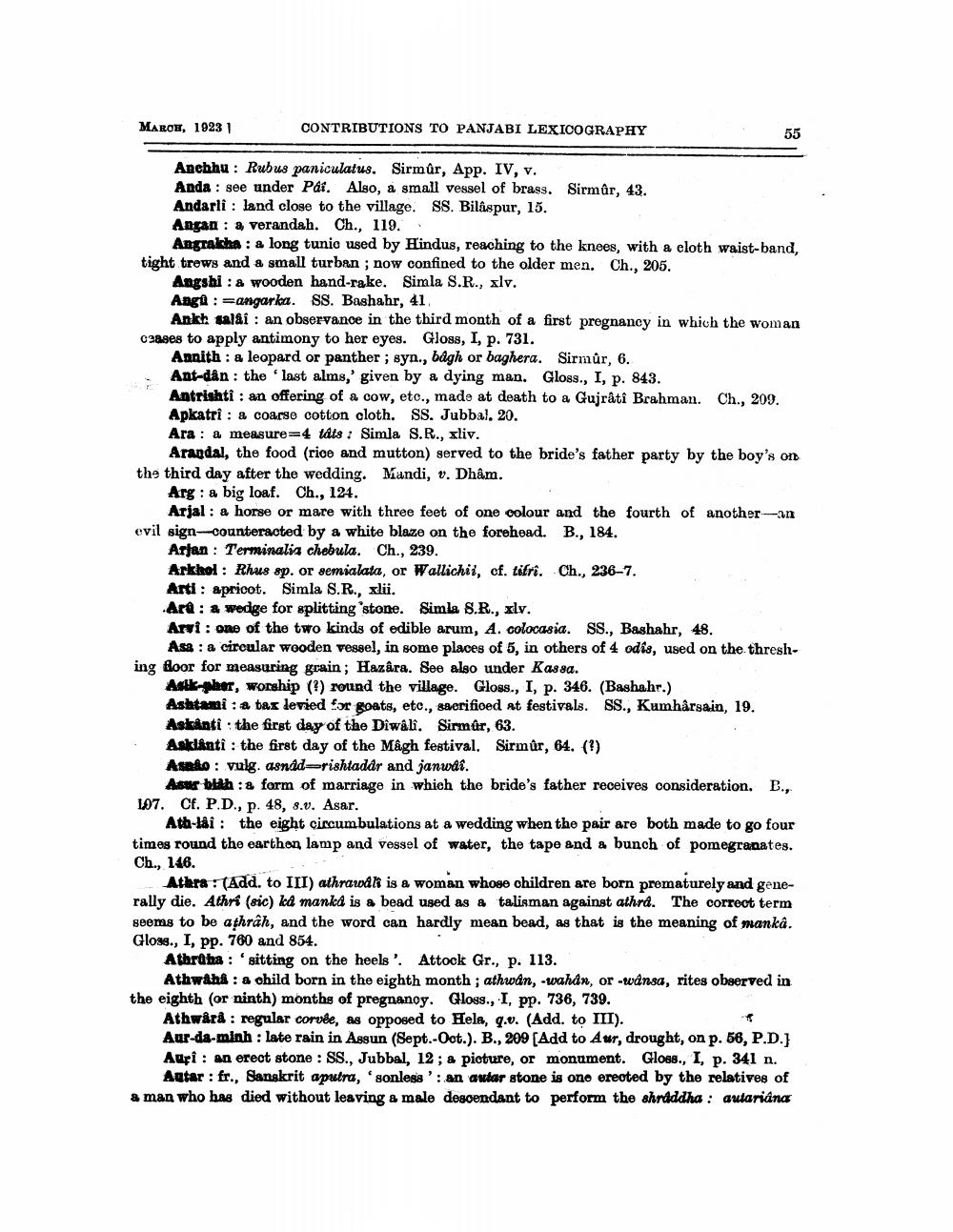________________
MAROE, 1923 1
CONTRIBUTIONS TO PANJABI LEXICOGRAPHY
:
55
Anchhu : Rubus paniculatus. Sirmûr, App. IV, v. Anda : see under Par. Also, a small vessel of brass. Sirmûr, 43. Andarlî: land close to the village. SS. Bilaspur, 15. Angan : a verandah. Ch., 119.
Angralcha: a long tunic used by Hindus, reaching to the knees, with a cloth waist-band, tight trows and a small turban ; now confined to the older men. Ch., 205.
Angshi: a wooden hand-rake. Simla S.R., xlv. Ang : =angarka. SS. Bashahr, 41
Ankh saldi : an observance in the third month of a first pregnancy in which the woman c2ases to apply antimony to her eyes. Gloss, I, p. 731.
Annith: a leopard or panther; syn., bågh or baghera. Sirmûr, 6. Ant-dan: the last alms, given by a dying man. Gloss., I, p. 843. Antrishti : an offering of a cow, etc., made at death to a Gujrati Brahman. Ch., 209. Apkatri : a coarse cotton cloth. SS. Jubbal. 20. Ara: a measure=4 tats: Simla S.R., xliv.
Arandal, the food (rice and mutton) served to the bride's father party by the boy's on the third day after the wedding. Mandi, v. Dhâm.
Arg : a big loaf. Ch., 124.
Arjal: a horse or mare with three feet of one colour and the fourth of another-an evil sign counteracted by a white blaze on the forehead. B., 184.
Arjan: Terminalis chebula. Ch., 239. Arkhol: Rhus sp. or semialata, or Wallichii, cf. Lifri. Ch., 236-7. Arti: apricot. Simla S.R., xlii. Art : & wedge for splitting 'stone. Simla S.R., xlv. Arvi: one of the two kinds of edible arum, A. colocasia. SS., Bashahr, 48.
Asa : a circular wooden vessel, in some places of 5, in others of 4 odis, used on the threshing floor for measuring grain; Hazara. See also under Kassa.
Adik-her, worship (?) round the village. Gloss., I, p. 346. (Bashahr.) Ashtami : a tax levied for goats, etc., sacrificed at festivals. SS., Kumhârsain, 19. Ashanti : the first day of the Diwali. Sirmûr, 63. Asklantî: the first day of the Mâgh festival. Sirmûr, 64. (?) Asko : vulg. asnadrishtaddr and janwdi.
Asar biah : 8 farm of marriage in which the bride's father receives consideration. B., 107. Cf. P.D., p. 48, 9.v. Asar.
Ath-lài: the eight circumbulations at a wedding when the pair are both made to go four timeg round the earthan lamp and vessel of water, the tape and a bunch of pomegranates. Ch., 146.
Athra : Add. to III) athrawdR is a woman whose children are born prematurely and generally die. Athri (sic) ka mankd is a bead used as a talisman against athra. The correct term seems to be athrâh, and the word can hardly mean bead, as that is the meaning of manka. Gloss., I, pp. 760 and 854.
Athraha : 'sitting on the heels'. Attock Gr., p. 113.
Athwaha : a child born in the eighth month ; athwan, -wahan, or -wansa, rites observed in the eighth (or ninth) months of pregnancy. Glogs., I, pp. 736, 739.
Athwårå : regular corvée, as opposed to Hela, q.v. (Add. to III). Aur-da-minh : late rain in Assun (Sept.-Oot.). B., 209 [Add to Aur, drought, on p. 56, P.D.} Auri : an erect stone : SS., Jubbal, 12; a picture, or monument. Gloss., I, p. 341 n.
Antar: fr., Sanskrit aputra, sonless': an antar stone is one ereoted by the relatives of a man who has died without leaving a male descendant to perform the shndddha : autariána




